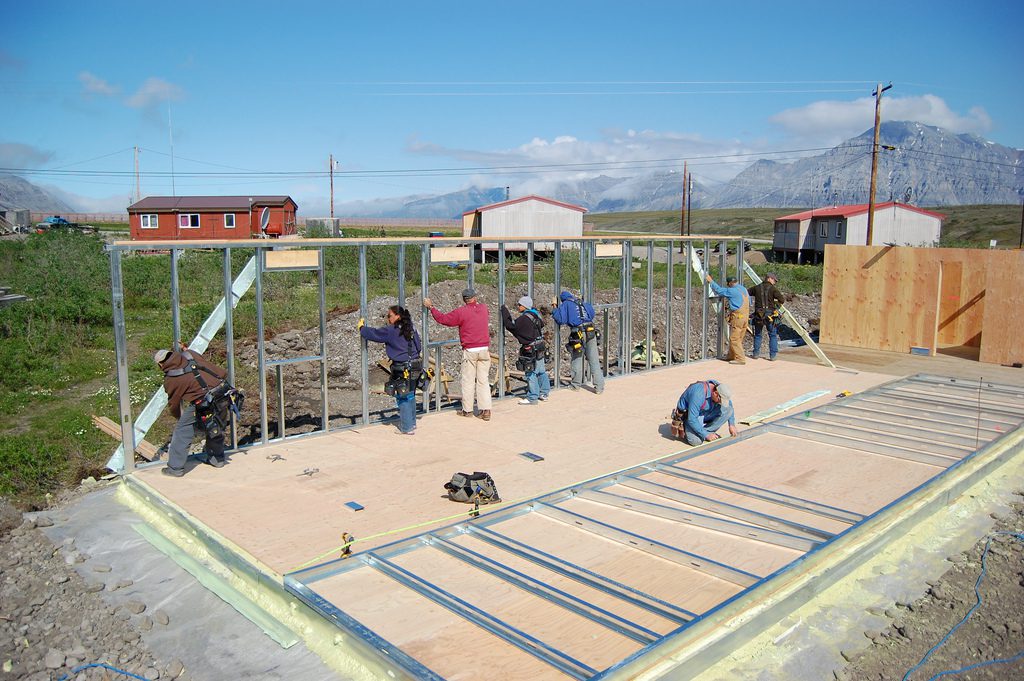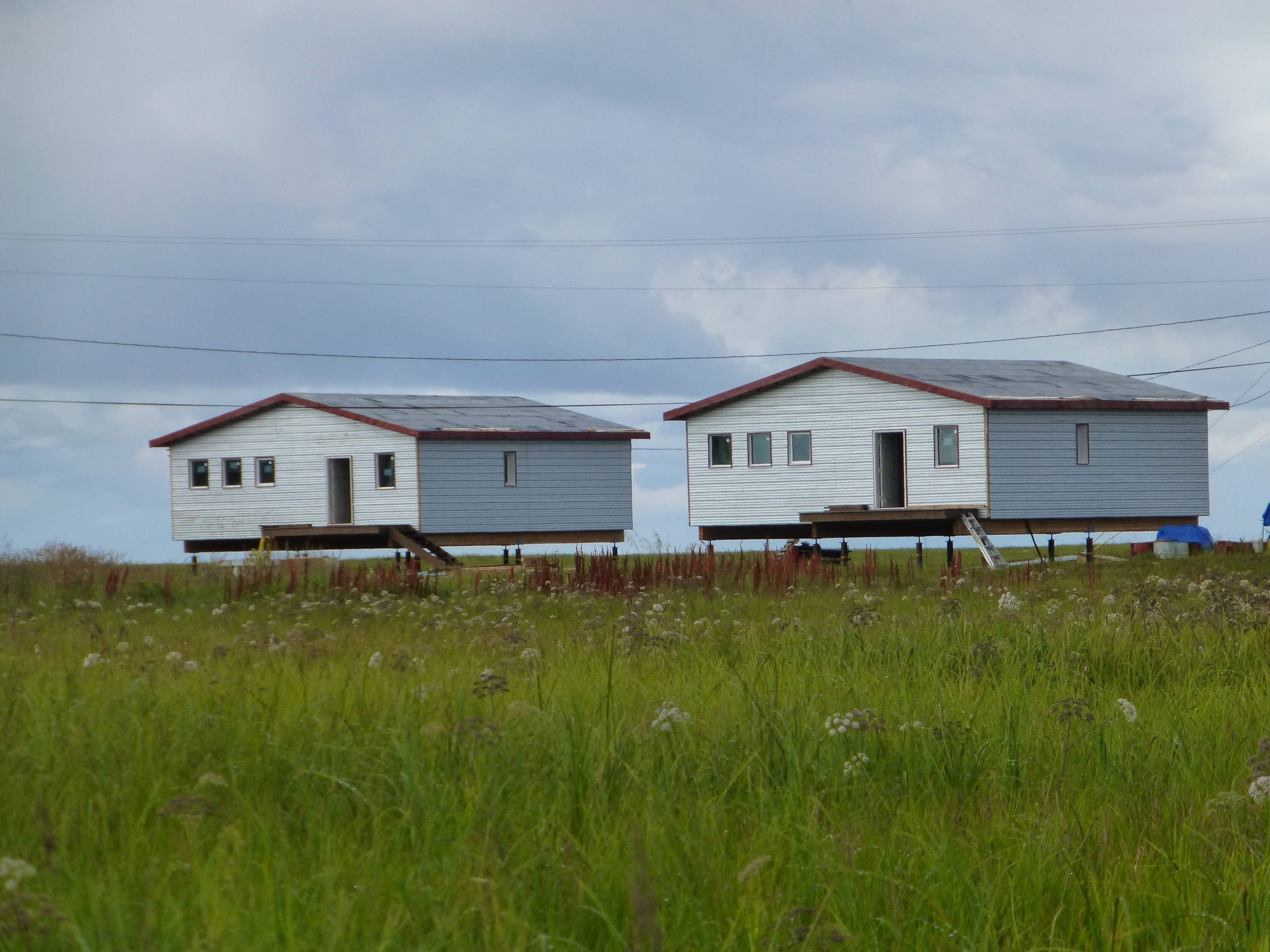Improving Indoor Air Quality—Community Spotlight
Cold Climate Housing Resource Center
The Cold Climate Housing Research Center (CCHRC), advances sustainable solutions for healthy and resilient homes in cold climates. Founded in 1999 in Fairbanks, Alaska, CCHRC is a nonprofit corporation created to facilitate the development, use, and testing of energy-efficient, durable, healthy, and cost-effective building science solutions for people living in circumpolar regions. In 2024, CCHRC celebrates 25 years of advancing cold climate technologies that have improved the condition of homes in urban and rural Alaska. CCHRC addresses all facets of housing, including socioeconomic and technological research, policy, homeowner education, and workforce development. The organization also collaborates closely with rural communities and urban areas to create climate-resilient housing development. Committed to community-driven change, CCHRC works to advance healthy, durable, and sustainable living environments.
 What are some unique and innovative programs or services offered by your organization? Or: Tell us about a current project that excites you. Or: What has been a win or top accomplishment?
What are some unique and innovative programs or services offered by your organization? Or: Tell us about a current project that excites you. Or: What has been a win or top accomplishment?
CCHRC is proud of our work with rural communities across Alaska. We have implemented upgrades and initiatives that promote healthy homes and enhance climate resilience across rural Alaska. Through several healthy homes programs, we have worked to create durable and safe homes, helping communities build and maintain healthy, more sustainable living environments.
CCHRC has a built-in holistic practice to address housing inadequacies across northern communities. Collaboration with communities to understand their unique environment, needs, challenges, and culture directs our work to build and maintain healthy, sustainable homes. No two communities are the same, and our innovative approach allows for creativity and ownership in addressing overcrowding, poor air quality, and insufficient building standards to improve an overall quality of life.
Education and training is a strong pillar of our mission. In the fall of 2024, CCHRC will launch a cold climate owner-builder class intended to work with individuals who want to build their own home in the Interior of Alaska. This class aims to present information to build a home from the start to finish in one of the most extreme climates in the country, establish a cohort of community members, and strengthen the local economy. With partners in local government, financial institutions, the building community, and the trades, participants will graduate with a hands-on understanding of building their dream home that is energy efficient, healthy, and resilient to Alaska’s quickly changing environment, while enjoying benefits such as one-on-one consultations with building experts, interest rate reductions and material discounts. The community is enriched by supporting local owner-builders and building more high quality homes.
How has your organization’s work made a difference for healthy housing in your community?
Out of all homes built in Alaska over the past 25 years, one in five utilizes some kind of CCHRC invention or research.
CCHRC has invented several technologies for homes in Alaska and other circumpolar communities. The BrHEAThe system is an integrated heating and ventilation system that improves energy efficiency in homes while maintaining healthy indoor air quality. The system marries heating and ventilation so that incoming air is always warm and fresh, important in cold climates where lots of energy goes into heating homes in the winter. CCHRC has done everything from small-scale retrofits like installing bathroom fans to helping communities facing coastal erosion facilitate a managed retreat or relocation. CCHRC also conducts research on a variety of housing-related topics including heat pumps, ventilation and insulation, housing impacts on health, and resilient home designs for cold climates.
 In addition to our technological advancements, CCHRC is deeply committed to educating homeowners by empowering all Alaskans with a comprehensive understanding of how their homes function as a system and can promote health and well-being. Our homeowner education series offers a wide range of classes to the public at no cost. These sessions cover an array of topics, including heat pumps, creating healthy home environments, and maintaining good indoor air quality, among many others. We believe that knowledge about weatherization, efficient ventilation, and overall home maintenance is key to achieving an energy-efficient and healthy lifestyle.
In addition to our technological advancements, CCHRC is deeply committed to educating homeowners by empowering all Alaskans with a comprehensive understanding of how their homes function as a system and can promote health and well-being. Our homeowner education series offers a wide range of classes to the public at no cost. These sessions cover an array of topics, including heat pumps, creating healthy home environments, and maintaining good indoor air quality, among many others. We believe that knowledge about weatherization, efficient ventilation, and overall home maintenance is key to achieving an energy-efficient and healthy lifestyle.
What is the most important thing people should know about your organization or your work?
Because we are supported by the State of Alaska, we are able to offer much of our services for free or at a reduced cost. Education opportunities and classes are supported through partnerships, and we strive to reach homeowners where they are. Our building experts come from the field and are curious about solving issues of our day: how we reduce our carbon footprint through innovative building materials, how to make information accessible to the smallest, most rural community, and just how to build a darn good home. At any time, anyone—living in Alaska, Michigan, or anywhere—can call our office and be connected with an expert to talk through their questions and concerns about building homes.
CCHRC has inspired and advanced sound building science to incorporate into resilient homes, and will continue to be an accessible resource for the daily dabbler and the professional homebuilder. We are passionate advocates for holistic housing that protects human health and the environment.
What do you think is the most pressing challenge facing your organization and/or the community you serve?
Climate change is the most pressing challenge our communities are facing. Circumpolar communities are feeling the effects of climate change with rising sea levels, changing ecosystems, and permafrost thawing at record levels; and our homes, jobs, and way of life are changing dramatically. As temperatures rise, traditional housing infrastructure is increasingly vulnerable to extreme weather events and shifting ground conditions, which can lead to costly repairs and displacement. In addition, the changing climate affects local economies and resources, exacerbating existing social and economic inequalities. At this point, adapting to a changing climate is not just an option but a necessity. Resilient housing solutions, innovative building practices, and homeowner education is a needed investment in navigating these unprecedented challenges to ensure a sustainable future.
What do you value most about your partnership with NCHH and others in the healthy housing space?
Healthy homes are at the core of our organization’s mission, and working with partners like NCHH enhances our ability to achieve this goal. Their expertise and resources provide crucial support, allowing us to stay informed about emerging opportunities and best practices in the field. This collaboration not only strengthens our efforts to ensure that every home in Alaska is healthy, durable, and sustainable but also amplifies our impact through collective knowledge and shared initiatives. Together, we can drive meaningful progress and create lasting change in our communities.
What is the most important lesson or piece of advice you would share with others doing this kind of work?
 Expand and leverage partnerships whenever possible. Our partners make our work possible and allow our small organizations to achieve bigger and better things. There are so many organizations with similar missions or doing work that closely aligns with ours, and working together is invaluable. By pooling resources, sharing expertise, and coordinating efforts, we can amplify our impact and reach a broader audience. Collaboration fosters innovation, strengthens our collective voice, and enhances our ability to address complex challenges effectively. Moreover, partnerships provide opportunities for mutual learning and growth, helping all involved organizations to improve and thrive.
Expand and leverage partnerships whenever possible. Our partners make our work possible and allow our small organizations to achieve bigger and better things. There are so many organizations with similar missions or doing work that closely aligns with ours, and working together is invaluable. By pooling resources, sharing expertise, and coordinating efforts, we can amplify our impact and reach a broader audience. Collaboration fosters innovation, strengthens our collective voice, and enhances our ability to address complex challenges effectively. Moreover, partnerships provide opportunities for mutual learning and growth, helping all involved organizations to improve and thrive.
To learn more about CCHRC’s work, visit CCHRC’s website or contact them at info@cchrc.org.
Latest page update: August 5, 2024.
